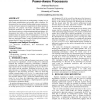Free Online Productivity Tools
i2Speak
i2Symbol
i2OCR
iTex2Img
iWeb2Print
iWeb2Shot
i2Type
iPdf2Split
iPdf2Merge
i2Bopomofo
i2Arabic
i2Style
i2Image
i2PDF
iLatex2Rtf
Sci2ools
ISLPED
2003
ACM
2003
ACM
Checkpointing alternatives for high performance, power-aware processors
High performance processors use checkpointing to rapidly recover from branch mispredictions and possibly other exceptions. We demonstrate that conventional checkpointing becomes unattractive in terms of resource and power requirements for future generation processors. We propose out-of-order checkpoint release and checkpoint prediction, two alternatives that require significantly less resources and power while maintaining high-performance. We demonstrate their utility at the register alias table (RAT). Our methods reduce the number of RAT checkpoints to 1/3 (from 48 down to 16) for an aggressive, 8-way superscalar processor with a 256-entry instruction window. Using a 0.18um process model we estimate that RAT power is reduced by 24%. Categories and Subject Descriptors C.1 Processor Architectures, B.8 Performance and Reliability. General Terms Algorithms, Performance, Design, Experimentation. Keywords Checkpointing, renaming, out-of-order execution, poweraware, power density.
8-way Superscalar Processor | Future Generation Processors | ISLPED 2003 | Out-of-order Checkpoint Release |
Related Content
| Added | 05 Jul 2010 |
| Updated | 05 Jul 2010 |
| Type | Conference |
| Year | 2003 |
| Where | ISLPED |
| Authors | Andreas Moshovos |
Comments (0)

